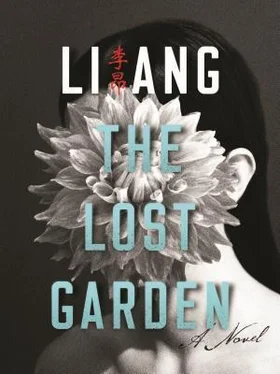“Do I have any of those?” Mother thought hard before finally remembering. “I bought them overseas before I got married. I did wear them, before and shortly after I married your father. Then, what happened? I probably stopped wearing them after that incident with your Otosan.”

Yinghong knew that Xigeng was besotted with anything refined and luxurious, partly because he had good taste, and partly because he understood that the greatest refinement and elegance meant something that could not be bought at any price.
She had let him touch her, little by little and only her arms, head, behind her ears and lips, all places usually not covered by clothes. When she decided to allow his hand under her clothes, she picked out satin underwear that had been washed once only to soften the fabric. The underwear had been called chemises before she grew into a woman, she recalled.
He had an 18,000-square-foot penthouse apartment that came with a living room decorated by a designer in the French style of pastel blue and lilac, and, yes, intersected with gray. It was in this room that she seduced him, though she made sure that he took the initiative of putting his hand under her clothes. She let him unbutton her blouse but would only allow him to touch her shoulders.
What was exposed was her white satin chemise, whose fabric was soft but thick enough to reveal nothing. She had made sure of that, and was certain he would not see anything, except for the lacy trim around the neck. To be sure, the eyelets on the lacy trim would betray her by revealing a bit of décolletage, and he could get a glimpse of her breasts. But would he see everything? No. She needn’t worry; the dense satin fabric was the ideal cover-up. No one, not even an experienced man like him, could detect anything by simply looking.
She knew that he retained a degree of deference toward her; in fact he was even a bit in awe of her. He held himself back for the time being and acted decorously, because she came from the Lucheng Zhu family, and because the large amount of delicate lace decorating the fine satin underwear created a lavish impression. It was never her intention to give in to him, not yet, so at this stage she had only planned to let him see part of her body, along with her beautiful, lacy underwear. The trim wasn’t handmade and not all that expensive, but she was certain that he had yet to learn, or might never learn, to tell handmade lace from one made by machine.
Under his gaze, she lowered her head bashfully, but let him gaze at her and her underwear. Naturally she had to stop his advances every once in a while. What went through her mind was how, given her current financial situation, she still could not afford underwear with real handmade lace, the chemise from her childhood.

“You’re a grown-up now, not a little girl anymore,” Mother had said.
Like most of the kids in Taiwan back then, she had been brought up on the instruction that “children have ears but no mouth,” except that it was Mudan, not her parents, who told her that.
Rarely would Father instruct Yinghong with these rustic sayings, and Mother went out quite a bit after Yinghong began middle school. She knew she should never inquire after her parents’ whereabouts, but it was clear to her that Mother was the one who ran the household.
And so, besides Father, Mudan was the person she saw most frequently after school; Mudan was also the one who took care of her.
Mudan had been Mother’s maid before her marriage but she had forged a close relationship with other servants in Upper House. The first few years after Father’s return, Lotus Garden saw few visitors. It was not until Yinghong was a third-grader, the year she wrote that she was born in the last year of the First Sino-Japanese War, that Father began to walk around the garden, and guests made visits.
The first group coming to get news was not her uncles from the Upper House but their maids and servants. Prompted by the country folk’s tendency to gossip, they came to see what had been going on in Lotus Garden. Some had been good friends with Mudan and were not afraid to come see her, now that there had been no serious consequences. Soon all the maids and servants had resumed their former relationships with Mudan.
Before coming with Yinghong’s mother to the Zhu family, Mudan grew up in Taipei’s Dataocheng area, which meant she had lived a different life than the other Zhu family servants, who had been hired from areas near Lucheng. All the Zhu servants agreed on one thing about Mudan — she was a nice person, but she talked too much and was a show-off.
Her tendency to show off had been apparent back when the clan lived in the Upper House together. At the time, the large family shared wells and Mudan had to fetch water every day. The inconvenience often led her to complain:
“We used tap water when we lived in Dataocheng. You turn the faucet and the water flows freely.”
It would take Lucheng more than two decades to get tap water, after Yinghong went to Japan and then to the United States to study. So when Mudan mentioned tap water to the other servants in the Upper House, it surely sounded wondrous and unusual, and Mudan did not stop there.
“There was once a soldier from China. When he saw in Dataocheng how we turned the faucet to get tap water to flow out of the wall, he went and bought a faucet and stuck it on his wall, but nothing came out.”
When she reached this point of her story, she raised her head and sneered, tossing the bun behind her head around. She said with great contempt:
“What a rube that soldier was. He had no idea that he’d need pipes before he could get tap water. He actually believed he could just drill a hole in the wall and fit the faucet on.”
Her audience naturally did not know how and where to bring the water over, so they peppered her with questions, which led to animated discussions.
Yinghong had heard plenty about tap water from Mudan ever since childhood and had asked her mother about details, but she still did not know how the water was brought over to turn into tap water. When she started middle school and gained a bit of basic knowledge, she finally understood, with an explanation from her mother, why Mudan had laughed at the soldier for fitting a faucet to the wall.
At the time, though Mother had been going out frequently, she never neglected Yinghong’s education. Yinghong could still recall, many years later, that no matter how busy Mother was, she would never raise her soft, gentle voice, nor would she look hurried. Over those years, she often wore Western-style dresses, usually a short jacket with a long A-line or pencil skirt, occasionally four- or six-panel ones. The jackets and skirts would be made of the same materials with the same patterns, some with lace-trimmed collars, others with thin piping on the jacket pocket, which was definitely not meant for hands; instead, sometimes there would be a Japanese handkerchief made with fine linen and decorated with multiple flowers whose pink tips peeked out of the pocket.
Unlike the schoolteachers, particularly those from the Mainland, mother never wore qipao , nor would she wear Taiwanese-style clothes. Only Western one-piece dresses or a jacket-and-skirt combination. There sometimes were hats made of the same material as the dresses; they were tiny round or boat-shaped hats trimmed with lace or veils, which she would wear a bit to one side.
Mother wore a hat of the same material as her dress occasionally when she went out, and it was when she was securing the hat to her hair with a bobby pin that she laughed brightly over the stories about tap water that Yinghong had heard from Mudan.
Читать дальше













